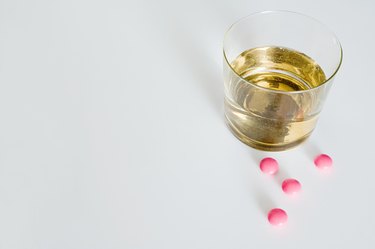
Mixing alcohol and diet pills can cause undesirable side effects. Alcohol and diet pills both contain stimulants, but the stimulants found in each substance are different. Diet pills often contain stimulants known as uppers that increase heart rate, breathing and blood pressure. Alcohol contains stimulants known as downers that slow reflexes, thin the blood and make you drowsy. They're both hard on your liver.
Liver Damage
Video of the Day
Alcohol and diet pills can cause liver damage when taken together or separately. Your liver filters everything your body consumes, which helps the digestion process. Chronic alcoholism or alcohol abuse can cause cirrhosis of the liver. Certain diet pills, such as over-the-counter Alli, are under investigation by the U.S. Food and Drug Administration for reports of liver injury. By combining alcohol and diet pills, you are mixing a potentially potent cocktail for liver disease. Liver disease affects the functionality of your liver. Symptoms of liver disease include yellow or jaundiced skin, liver failure, enlargement of the liver and portal hypertension.
Video of the Day
Increased Risk of Bleeding
Because alcohol thins your blood and diet pills increase blood pressure, taking them together can increase your risk of bleeding should an injury occur. Even if you were to just bump your arm and break the skin, it could warrant a trip to the hospital. Certain prescription diet pills, such as phentermine, can cause dangerously high blood pressure, according to Drugs.com. Taking those alone could result in an increased risk of bleeding. Due to the rapid increase of blood pressure, your heart may feel like it's pounding uncontrollably and you might feel like you're going to pass out. Adding alcohol into the mix worsens these side effects.
Increased Risk of Panic Attacks
During a panic attack, your heart begins to pound and you may feel dizzy and faint. Diet pills can cause an onset of panic attacks, according to HelpGuide.org, because of the amount of stimulants they contain. By consuming alcohol along with diet pills, you greatly increase the risk of experiencing a panic attack. You may also experience nausea and upset stomach during a panic attack; alcohol intensifies these symptoms. Panic attacks can also cause hot or cold flashes, which alcohol intensifies.